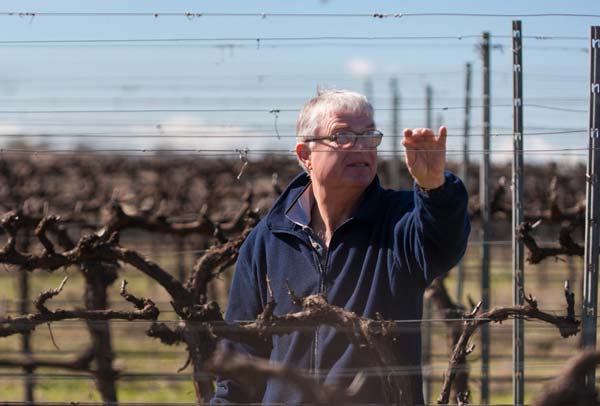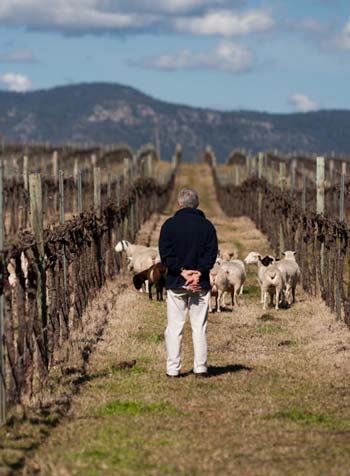The man from Broke
 Wendler on Wine •
Wendler on Wine •  Sunday, December 5, 2010
Sunday, December 5, 2010 Our wine correspondent Gabriel Wendler in conversation with Justice Peter McClellan, NSW's chief judge at common law and enthusiastic Hunter grape grower ... The diversion of the vineyard  Wendler: Many lawyers are probably unaware that you have been a vigneron in the Hunter Valley, Australia's oldest viticultural region, for longer than you have been a judge. How did you come to be interested in grape growing?
Wendler: Many lawyers are probably unaware that you have been a vigneron in the Hunter Valley, Australia's oldest viticultural region, for longer than you have been a judge. How did you come to be interested in grape growing?
HH: One of my grandfathers was a fruit grower just outside Leeton for many years. I worked as a fruit picker during my university days and have always been attracted to rural activities. For many years I thought about growing grapes but only when Rosemount became a client and I came to know the Oatley family did I understand how to do it. I initially developed the vineyard at Broke in accordance with Rosemount's requirements for grapes.
Wendler: You established Wattlebrook in 1994 in the central Hunter or Broke/Fordwich region - 80 acres of shiraz, semillon, chardonnay and verdelho. Apart from being a visually stunning area it has a remarkable history. Small individual vineyards were planted after the land was allocated to returned soldiers following WW1 in accordance with the Fordwich Soldier Settlement Scheme. From about the early 1930s the Tulloch and Elliot families had significant involvement in the region's viticulture. It is often said the Broke/Fordwich region produces chardonnays and semillons that are readily distinguishable from the Lower Hunter and the reds are considered to have greater intensity of flavour and colour.
HH: The Broke Fordwich region has a different micro climate to the lower Hunter and the good properties have distinctive soils. Broke Fordwich is further from the coast than Pokolbin and receives less rain fall. The soils on my property and a few others at Broke are quite unique. The majority of the soil is volcanic being the product of the geological formation known as the Fordwich Sill, a defined area about five kilometres in length and less than one kilometre in width. The soils are called Saxonvale chocolates.
The geological advice is that the cell structure of this soil is only repeated in one other location in Australia. It is also found in some small areas in Eastern Europe. The cell will take up moisture to its optimum and then allows all other moisture to pass making it well drained, an essential requirement for the growing of grapes. Because of its cell structure the farmers call in "Monday ground".
If it rains on Sunday you can work it on Monday. The balance of our soils are alluvial sands adjacent to the Wollombi Brook which are perfect for growing semillon.
 Peter McClellan at Wattlebrook
Peter McClellan at Wattlebrook
Wendler: Is the vineyard and your interest in wine a way to disengage from the rigours of trial and appellate work?
HH: The vineyard provides me with a great diversion. I define the management approach, but it has a full time manager and an assistant so I do not have to involve myself in the day to day physical activities. There is a great satisfaction in producing a good vintage and high quality wines. It provide a great contrast to my working week.
Wendler: Wattlebrook recently obtained a biodynamic classification and there are only a handful of Hunter vineyards that have managed to achieve this. Was this classification difficult to achieve and does this classification significantly influence the decision of a winery to purchase grapes?
HH: To become organic or biodynamic a vineyard must follow particular management practices. Primarily this requires the operator to avoid using synthetic chemicals. For example, we cannot use Roundup to kill weeds. For that reason we breed sheep to assist in reducing the weed population throughout the vineyard. They feed between the vines after the grapes have been harvested each year.
Our organic status has been very important in broadening the market for our grapes. Some wineries are exclusive organic and look to organic vineyards to provide material for their product. We now supply Tamburlaine the largest organic wine operation in Australia.
Wendler: I'd like to get your views on cork versus stelvin capsule closure for wine bottles. International wine writer George Taber says: "The market for wine-bottle closures is a four billion battlefield where an epic confrontation is now taking place." James Halliday believes that winemakers who believe in cork are members of the "flat earth society". Andrew Jefford of Decanter Magazine has written: "The ayatollahs of screw caps have made it seem morally defective to speak up for cork." As cork is a natural product do you consider stelvin capsule closure out of kilter with organic viticultural practises? His Honour with weed eatersHH: James Halliday is right. Although the source of the problem is not always known by the consumer - 10 percent of wine sealed with cork will be adversely affected, either because of cork taint or random oxidation. If you want the best wine, stelvin closure is the answer.
His Honour with weed eatersHH: James Halliday is right. Although the source of the problem is not always known by the consumer - 10 percent of wine sealed with cork will be adversely affected, either because of cork taint or random oxidation. If you want the best wine, stelvin closure is the answer.
Wendler: The three most fascinating Hunter red wines in my taste memory are Mt Pleasant 1953 Hermitage 22T made or, perhaps more correctly, blended by the legendary Maurice O'Shea; Hector Tulloch's 1954 Hunter Dry Red; and Murray Tyrrell's 1966 Vat 83 Dry Red - all made from shiraz. What are your three most memorable Hunter red wines?
HH: My most memorable Hunter red wines are Lindemans 1965 and 1968 shiraz - then called "Hunter River Burgundy". The 1965 was the best. I have not tasted the 1953 Mt Pleasant but would rate the 1966 Tyrells highly. The best shiraz I have made at Broke is 2003, although 2005 was rated highly by James Halliday.
Wendler: When you have an exceptional grape harvest you sell your wine through the internet, at the Broke store and in some selected restaurants. At the prices you charge it seems to me to be excellent value. Your 2005 Bird's Keep shiraz achieved a very respectable 94/100 Halliday rating. However, I understand the 2009 vintage for shiraz was literally a washout. As is often the case in the Hunter there is too much rain at the wrong time. Was it difficult to sell your shiraz?
HH: My policy at Wattlebrook is only to make wines in the good years. If the grapes are not suitable for our purposes they are all sold, which occurred in 2009. When we make a shiraz the quality is such that it sells itself.
Wendler: What is your prognosis for grape growing in the Hunter and generally? You have expanded into Mudgee does this suggest optimism, despite fierce competition being generated in our region from New Zealand, South America and South Africa? Will new markets in China be the answer?
HH: The outlook for the grape industry in the Hunter and generally throughout Australia is bleak. I expect with Fosters closing down in the Hunter at least a third of the vineyard area will be lost. This will be repeated throughout Australia. The over-planting in Australia - the product of inappropraite concessions by way of accelerated depreciation allowances given by the Federal Government - and the value of our dollar have created significant problems. There is optimism in relation to China, which is a market with a potential to grow quickly. However, growth in that market will not avoid much pain in Australia.
Wendler: There must be some days when you feel the temptation to immediately exchange judicial life for viticultural life? Has the most jealous mistress been the courtroom or the vineyard?
HH: I greatly enjoy my work as a judge. Viticulture provides me with a contrast and has given my children a great rural education. My 19-year-old son tells people he was brought up on a farm. However, I do not expect to become a fulltime vigneron any time in the foreseeable future.
Gabriel Wendler is a Sydney barrister and Justinian's wine correspondent
 Justice Peter McClellan
Justice Peter McClellan 








Reader Comments